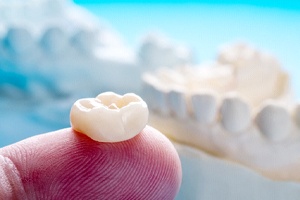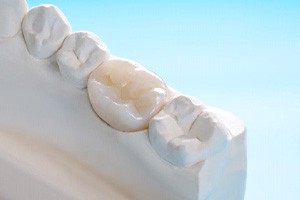
Dental Crowns – Watertown, MA
Renewing the Strength of Damaged Teeth

Teeth cannot heal on their own, so when one is damaged, it is important to take steps to protect the tooth and prevent the situation from worsening. Dental crowns are often able to achieve that end. They can even restore the function and appearance of teeth that have suffered significant decay or trauma. Here at All Dental in Watertown, we are proud to offer attractive, high-quality crowns. Contact us today to learn more about this treatment.
Why Choose All Dental for Dental Crowns?
- One-Visit Restorations Available
- Friendly & Skilled Team
- Preserve Damaged Teeth
What Is a Dental Crown?

Dental crowns in Watertown are custom-made tooth-shaped “caps” that fit over the entire visible portion of a tooth (everything above the gumline). Their primary purpose is to protect damaged teeth. However, they can also play a role in helping a patient achieve a better bite or even in replacing lost teeth altogether.
Our team might recommend a crown for you if:
- One of your teeth has recently undergone root canal therapy.
- You have a crack in one of your teeth
- Chronic grinding and clenching have severely worn down your tooth enamel.
- You wish to correct the appearance of a particularly unsightly tooth.
- You have a cavity that cannot be treated by a filling alone.
The Process of Getting a Dental Crown

The traditional crown process requires at least two appointments. At the first, the tooth is modified so it will fit well beneath its restoration. Then, impressions are taken and a temporary crown is placed. While a dental lab fabricates a permanent crown, the temporary restoration protects the tooth. From beginning to end, the entire process usually takes a few weeks.
Some patients are eligible for one-visit restorations. As your state-of-the-art dentist in Watertown, we can use a digital impression scanner to create a three-dimensional representation of your teeth. Then, sophisticated software helps us design your crown, after which our in-house milling unit creates the crown out of top-quality porcelain. This streamlined process usually takes just a few hours and eliminates the need for a temporary crown.
Regardless of which type of crown you receive, you can expect us to do our best to make sure you are comfortable throughout your procedure.
The Benefits of Getting a Dental Crown

Some of the most noteworthy benefits of dental crowns include:
- By protecting damaged teeth, they can often prevent extractions.
- They can reduce or eliminate the pain and sensitivity that may result from worn enamel, cracks, and decay.
- They may renew your ability to eat your favorite foods.
- Porcelain crowns look incredibly natural and can enhance your smile’s beauty.
- With proper care, a crown can last for 15 years or longer. Most crowns can reach their longevity potential if you adhere to proper oral hygiene, avoiding biting on extremely hard foods, and visit a dentist for regular preventive care.
Dental Crowns FAQs

The All Dental team in our Watertown office is ready to renew the strength and appearance of your damaged teeth with dental crowns. Prior to your consultation, though, you might want to gather more information about the road ahead. To help you have realistic expectations for the path in front of you, we have put together the following list of dental crowns FAQs. If you do not see the answers to your specific questions, give us a call. We look forward to speaking with you!
Are Dental Crowns Permanent?
In a sense, it is accurate to say that dental crowns are permanent. During the preparation portion of your treatment process, we will have to remove a portion of your tooth enamel. The enamel will never grow back on its own, so the tooth will always need a crown to keep it sheltered from outside stimuli.
Even though dental crowns require a permanent commitment, the crowns themselves do not last forever. On average, crowns need to be replaced every 5 – 15 years or so. You can help your restoration stand the test of time by sticking to a good oral hygiene routine, visiting us regularly for checkups, and taking other basic precautionary measures.
How Do You Know When a Dental Crown Needs to Be Replaced?
Here are some signs that you should book an appointment with your dentist so they can take a look at your crown:
- You are suffering from pain or sensitivity in the tooth beneath your crown.
- A crown feels unsteady or loose.
- You have an uneven bite that makes it difficult to comfortably chew food.
- Your crown has obvious signs of wear and tear or damage. For example, if you have a porcelain-fused-to-metal crown, you might notice a dark line along its base.
During your appointment, our team can let you know for sure whether your crown needs to be removed and replaced with a new one.
Do Dental Crowns Get Cavities?
Unlike natural dental enamel, crowns cannot develop cavities. However, the teeth beneath crowns are almost as vulnerable to decay as uncrowned teeth. Plaque and bacteria can accumulate along the gumline and sneak beneath the crown, where they can start to damage the underlying dentition.
You can significantly reduce your risk of cavities by sticking to a thorough oral hygiene routine. It is especially important that you clean the area along your gumline.
Does It Hurt to Get a Dental Crown?
When we are preparing your tooth for your crown, we will make sure your mouth is numb. You might feel some pressure, but there should be no real pain. Once the local anesthesia wears off, you can expect some temporary soreness and sensitivity, both in the treated tooth and the surrounding gum tissue. You may also experience mild discomfort after your permanent crown is placed. Any pain should wear off within a few days. Call us if you experience severe pain or other worrisome symptoms.